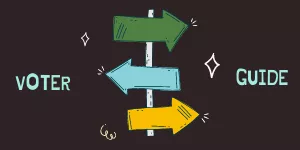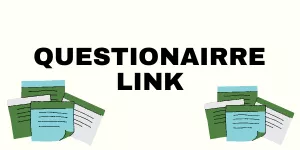You can make a big impact in only 30 minutes this April by giving your opinions. Starting on April 10 at noon, there will be an annual survey about Wisconsin natural resources. Open for 72 hours, the Wisconsin Conservation Congress (WCC) survey allows your voice to be heard. The questions cover many areas such as wildlife, water, land use and many other natural resource issues. Click here for our voter guide (for the WCC Advisory Questions, we do not have a voter guide for the Fisheries or Wildlife Questions). Click here to fill out the survey.

|

|
This online survey is referred to as the “Spring Hearing” and is conducted by the Wisconsin Conservation Congress every year. RSVP here and we'll send you information when the voter guide is live! Starting April 10 at noon, review our voter guide and then fill out the survey. We only have a voter guide for WCC Advisory Questions and are supporting some introduced resolutions. We do not have a voter guide for the Fisheries or Wildlife questions.
Background:
What is the Wisconsin Conservation Congress? It is a state-funded statutory group focused on collecting citizen input and serves as an advisory partner to the Natural Resource Board and works with the Wisconsin Department of Natural Resources. In fact, it is their mission to “gather and convey the wisdom and influence of Wisconsin citizens in the formation of natural resource policy, research, education and conservation.”
Why is voting in the online “Spring Hearing” so important? You can weigh in on important state issues, showing public support (or not) for things that the DNR could ultimately influence or change here in Wisconsin. Additionally, Wisconsin lawmakers and the media look at the overall results in reporting and when drafting bills and reference local results in the counties they represent when voting in the Wisconsin legislature throughout the year. We’ve seen some examples of how important the Conservation Congress vote is in the last few months. In the environmental analysis of the Line 5 pipeline, the DNR referenced the Conservation Congress vote as an indication of the public thoughts of this bill. In February, at a hearing on the Every Kid Outdoor bill, Senator Jacque used the Conservation Congress vote to describe the vast public support for the program.
Frequently Asked Questions
Q: Why should I allow 20+ minutes to take the WCC survey?
A: Some questions can be a bit tricky and seeing words like “killing contests” without reading the question and answering “no” quickly might not be the answer you want to give. Best advice read it slowly and fully.
Q: What should I do if I don’t understand or feel comfortable answering a question?
A: You should answer “no opinion” and keep moving.
Q: Why was my survey different than my friend’s survey who lives in a different county of WI?
A: Each county could have different “citizen resolutions” so likely that portion of the survey will differ from county to county in our state.
Q: Do you have to answer all the fishing questions?
A: Good news, this year the DNR doesn’t have that many and you can always answer “no opinion” to a question you are not sure about.
Q: Do you have to complete each section?
A: No, but we highly encourage everyone to answer WCC Advisory Questions and the citizen resolutions.
Conservation Congress Voter Guide
|
Q |
Question |
Position |
Background |
|
52 |
Does the public support more testing and stricter standards for PFAS levels including in biosolids and groundwater? |
YES |
PFAS are dubbed “forever chemicals” because they’re very difficult to break down, and, what’s more, are carcinogenic, interfere with our hormone systems, and have made their way into Wisconsin’s waterways and drinking water. |
|
53 |
Do you support increasing the protection of Wisconsin’s environment by recommending the Wisconsin Legislature reinstate the Prove It first Mining Law-1997 Act 171? |
YES |
The reason for Wisconsin’s landmark “Prove it First” law for mining in metallic sulfides is simple and remains true to this day: there has never been an example of a metallic sulfide mine that has safely operated and closed without polluting the environment |
|
54 |
Do you support the WCC working with the DNR, the Natural Resources Board and our state legislature to implement a statewide ban on lead jigs and sinkers weighing 1oz or less? |
YES |
As responsible stewards of the land, it is our responsibility to reduce lead in the environment to ensure a diverse and viable wildlife population for future generations.
Lost tackle directly impacts populations of loons, swans, eagles, and osprey. In the last 27 years, Northern Wisconsin's Common Loon population has decreased by 22%.
A recent study that sampled 1200 eagles in thirty-eight states, including Wisconsin, found nearly half of all bald and golden eagles suffer from chronic lead poisoning. |
|
55 |
Do you support the Conservation Congress and WDNR working cooperatively with other conservation organizations to develop a statewide outreach program that increases the use of non-lead ammunition to end the lead poisoning of wildlife? |
YES |
|
|
56 |
To reduce potential groundwater and surface water nitrate and ecoli contamination, do you support the DNR requiring best available groundwater monitoring protocols for all permitted CAFO operations in Wisconsin? |
YES |
Wisconsinites deserve to be able to drink their water without concerns for safety, yet many can not. |
|
57 |
Do you support a ban on the shining of wildlife in the state of Wisconsin from Sept 15th thru December 31st? |
YES |
Hunting at night with dogs, ATVs, and snowmobiles raises public safety concerns, is highly disruptive to people who live in rural areas, and contributes to a greater likelihood of illegal poaching activities |
|
59 |
Do you support the conservation Congress work with the DNR and the Legislature to develop language to strengthen Wis Waste of Resources 23.095 (1M) to prohibit the waste of game animals and fish in Wisconsin? |
YES |
Most states have wanton waste laws to prevent people from harvesting animals and then not utilizing them. Wildlife killing contests leave piles of dead coyotes, crows, and other species. Our state’s wildlife is considered a public resource, and behavior that results in the needless killing of wildlife without any utilization undermines the ability for everyone to enjoy our natural resources. |
|
61 |
Do you support opening the beaver season two weeks earlier and closing it four weeks later in each zone? |
NO |
With such an outdated Beaver Management Plan, and new information about the benefits of beavers on ecosystems and flood mitigation, the plan should be updated before increasing hunting of beavers |
|
62 |
Do you support allowing the continuously scanning of the landscape while hunting at night, using infrared light-based equipment? |
NO |
Hunting at night with dogs, ATVs, and snowmobiles raises public safety concerns, is highly disruptive to people who live in rural areas, and contributes to a greater likelihood of illegal poaching activities |
|
63-68 |
Hazardous Wake from Wake Surfing Boats |
YES |
These boats create hazardous wakes that create a safety hazard to others using the lake; damage the environment; and erode the shoreline. Particularly concerning is the churning of the lakebed, destruction of aquatic plants & spawning beds, and swamping of loon nests. |
|
74 |
Would you Support Legislation Creating a Free Fishing Weekend Specifically for Veterans “Vets on the Lake” for All Waters in Wisconsin? |
YES |
Removing barriers like the cost of a license or entrance fee are important steps to making sure everyone has access to enjoy our natural resources. |
Additionally, we’re asking voters to support the following resolutions we’ve put forward (these will only be in counties where residents introduced the resolution):
Removal of administrative barriers to Stewardship Program project approvals
The program has enabled the Department of Natural Resources, local communities, and conservation nonprofits to conserve land, create parks and fisheries, protect habitat, and expand recreational opportunities. This program has benefitted every county in the state.
Unfortunately, unnecessary layers of bureaucratic red tape have delayed and attempted to halt a number of Stewardship Program projects.
Wisconsin DNR Support of Farmers with Non-lethal Prevention Programs
Farmers need funding to prevent livestock depredation. Most predators can be discouraged by non-lethal means, while killing predators, especially wolves and coyotes, is often counterproductive.